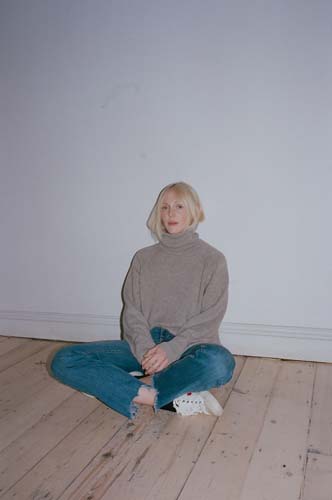Quite often these days, Laura Marling takes the bus from her home in North London halfway across the city to the British Library — a long journey, filled with many stops and much traffic, and one she has come to regard as an opportunity to begin writing a journal. “But I find it hard to think of myself as a subject,” she says. “I really struggle to write ‘I’.”
The subject of who Laura Marling is might seem a simple one: six albums, Grammy nominations, Brit Awards, Mercury nods, a steady path from a childhood in Berkshire, via the noughties nu-folk scene, to an esteemed and familiar musical presence. Still, the peculiar truth after all this time, is that Laura Marling is perhaps not quite who you might think she is.
She was just 18 when she released her debut album, Alas, I Cannot Swim, and the records that followed, from I Speak Because I Can in 2010, through to 2017’s Semper Femina, captured a young songwriter exploring both her craft and identity. Her voice — a supple, mesmerising thing, evolved too: richer, harder, smokier when called for, while the songs spoke of wisdom and worldliness and womanhood. But youthful success has a habit of crystallising its subjects, and for many, Marling remained forever the naive, clear-voiced folk singer of her earliest days.
But she is 30 now, and her seventh album, Song For Our Daughter, finds her a wholly different proposition: an artist whose gifts are diverse and accomplished, her interests broad, her talent at its most powerful. She is today a quite singular voice in the recording industry.
The route to this exceptional new collection of songs began in the wake of touring Semper Femina, when Marling stepped away from both her record label and her management, and for the first time in many years found herself without any firm idea of her future.
Instead she chose the unexpected: she collaborated with the theatre director Robert Icke; she formed a duo called LUMP with Mike Lindsay from Tunng, recording and touring an album of dissonant melodic beauty. Then she enrolled in a masters degree in psychoanalysis.
For a time she distanced herself from the idea of being Laura Marling — all of the connotations and associations her own name conjured, and began to explore something new. She realised that the songs she wrote after Semper Femina “felt too much like similar rewritings of other ones — like a writer who’ll write the same book over and over again,” and pushed herself to write beyond the known edges of herself. “And that was quite painful for me actually,” she says. “It’s the first time I’ve made a concerted effort to not just keep writing the same song again.”
The effect of exploring beyond her familiar world — her collaborative experiments and academic studies particularly, has been to liberate her. The next twelve months will also bring a new album from LUMP, and Marling credits the experience of working with Lindsay for a new perspective on songwriting. “Lump gives me a totally different space,” she says, “it’s just so much easier for me to have a really differentiated persona and the outcome is such a surprise to me.”
She and Lindsay are, she says, “polar opposites” but it is a collision that works well: “I think that juxtaposition of personality is really vital,” she says. “We’re pals, obviously, but we don’t talk about really in-depth things. I still wouldn’t say that we know each other that well.”
It has freed her too from the precision and distinct narrative of her solo work: “A lot of the vocal takes are the first take, so you can hear a bit of stumbling over words and the randomness of the lyrics and then it starts to inform itself,” she explains. The lyrics of the forthcoming Lump album will pursue this idea further: “It’s quite informed by psychoanalysis,” she says, “all the language of psychoanalysis is so beautiful because it’s so distancing.”
Time away has also allowed her to find a new kind of settledness. After many years of touring, and time living in the US and on the south coast, she has returned to London, living one street away from her oldest sister and her niece; her middle sister shares her home; she describes herself as “at a very comfortable place in my life, in a functioning long-term relationship.”
The first record Marling has written away from the road, it is perhaps this contentment that has allowed her to step away from confessional songwriting. “It’s really hard for me to say, but I think that lack of ‘I’ is probably there,” she says. “I’m aware of being looked at, internally, by the proximity of people around me. There’s a really good Henry Miller quote where towards the end of his life he stopped writing and started painting and said ‘I found painting to be the only medium by which I couldn’t cause people harm’. I was like ‘I feel you!’”
Instead she has moved towards storytelling, interweaving these tales with personal experience. “A song like Hope We Meet Again is a hangover of a time where I was very happily solitary travelling the world,” she explains. “The End of the Affair is similar — the idea that love is this infinite thing that goes in every direction and it’s very powerful. And the idea of a private mourning of love is so tragic to me, something so huge that can’t be shared.”
Marling had just read Graham Greene’s novel of the same name when she wrote the track, and several of these new songs are responses to others’ stories. Alexandra, for example, is a half-nod to Leonard Cohen’s Alexandra Leaving, and her fascination with the singer’s attitudes to women. “He writes about women in such a beautiful way,” she says. “It doesn’t aggravate me that he lived the way he wanted to live. In fact I think it’s very brave of people to live that way.”
Only the Strong borrows a line — ‘love is a sickness cured by time’ — from Robert Icke’s play Mary Stuart — for which Marling wrote the music. “I did change a lot of my style of lyric writing I think since I met Robert,” she says, “I couldn’t really say how, though it was interesting to see his playwright or director brain work with rhythm; he’s really into straight, really locked in rhyme. I’m much more into the rhythm of language now.”
Still, much of Song For Our Daughter remains hugely intimate. The title track for instance — a delicate yet defiant composition about “innocence being taken away prematurely, which is a big theme in my life I think, and the idea you could arm the next generation in a way that you weren’t armed.” Writing it made her cry.
She regards Fortune as “one of the better songs I’ve ever written from a song writing perspective” — its theme grew out of Marling asking her Mother why she had always kept a ‘running away fund’ and seeing “a kind of tragic impotence to that generation, their little attempt of carving out their own little bit of freedom.” The song began in her kitchen, with her father, a chord sequence, then a quick tumble of lyrics. “No one else gets to see that process, apart from my Dad actually,” she says. “And it’s nice for people to see it happen in real time; it nearly knocked him off his seat, it was quite sweet. So it has a special place in my heart.”
The album’s closing track, For You, has a similar sweetness: written at home with her boyfriend playing guitar, it has all the simplicity and irresistibility of the finest love songs. She chose to keep it on the record in its demo form.
To Marling’s surprise, living in close proximity with others has shifted her relationship with sound. It is the first time in her life that she hasn’t been able to have extended periods alone — her frequent library trips are in part about seeking the refuge of silence.
She has built herself a studio in the basement of her house, where she can spend her time enjoying “a lot of experimenting with sound” — in part a result of working with Semper Femina producer Blake Mills, who showed her “how much character you can draw out of sound” and of course her work with LUMP, where her voice is often used as an instrument.
She also gained considerable confidence from self-producing 2014’s Short Movie, and though she returned to Ethan Johns to co-produce Song For Our Daughter, she was steadfast in her vision for the album. “I demoed everything really heavily, and re-edited loads of stuff,” she says. “So I did all of the arrangements, I knew all the musicians I wanted to work with. I mixed the record with Dom [Monks — who has engineered several Marling albums]. And all of the backing vocals on this album I did at home because I wanted no one else’s opinion!”
It is a lusher sound than previous Marling records, with broad sweeps and an abundance of strings by Rob Moose (Antony and the Johnsons, Bon Iver, the National) “I wanted to indulge in that,” she says. “I just wanted to let him go free.” She wanted the spaciousness she had found with LUMP “where you’re in an aural world rather than sitting watching something; or like a really great Bill Callahan album where it feels as if he’s in the centre of your brain.”
There is an unexpected melodic poppiness too — there on tracks such as Held Down, Blow by Blow and For You. “So I was introduced to Paul McCartney at the later stage of my life,” she laughs. “I was Lennon. And I really only saw a surface level of Paul McCartney — dyed hair and Converses that I found unacceptable. But then I did the full catalogue of solo Paul McCartney stuff and saw I was obviously wrong. You realise the little things that get you, the little sentiments.” She describes Blow by Blow then as “my little homage to Paul McCartney … I was just trying to write a bit more simply and it’s so much easier on the piano because I’m so bad at it, I’m forced to really simplify.”
After several years of recalibration, this year will be another shift for Marling: two new albums, headline tours, festival slots, and, one imagines, many more collaborations, experimentations and solo adventures to come. “I wanted to get this album done so I could go on tour by myself for six months,” she laughs. “I’m really looking forward to that.” She is, it seems, getting used to being the subject again.
Laura Marling


